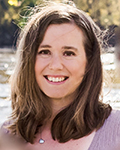We’re taking time over the following weeks to get to know the members of the GSA’s Early Career Scientist Committees. Join us every week to learn more about our early career scientist advocates.

Ryan Briscoe Runquist
Co-chair, Steering Committee
University of Minnesota
Research Interest
The earth is shared by a multitude of amazing and diverse organisms, and we are only beginning to find and understand many of them. Studying the processes that drive the generation and continued coexistence of these diverse life forms is fundamental to the study of biology and ecosystem function. At the heart of all biological systems, evolution and adaptation to different environments are the sources of diversity. To contribute to long-term levels of biodiversity, recently diverged species must be able to coexist without re-fusing when they meet again. My research addresses the processes that underlie the origin and maintenance of biological diversity; I study the mechanisms of coexistence of recently diverged species by integrating evolutionary and ecological approaches.
I focus on how plant reproductive interactions contribute to floral evolution and affect reproductive isolation, thus driving the assembly of communities and landscape community patterns. From an evolutionary perspective, I look at how species diverge within an ecologically relevant context. I’m currently examining the evolution of reproductive isolation between two recently diverged lineages of Clarkia xantiana. The two subspecies (C. xantiana and C. parviflora) diverged in isolation and have recently come back together in a zone of secondary contact, which lets us test how different mechanisms, particularly pollinators, have contributed to their evolution and continued divergence
As a PhD-trained scientist, you have many career options. What career paths interest you the most?
I have been fortunate to work at the intersection of many biological disciplines; I’ve been inspired by many amazing scientists. I would like to use my career to bring this sense of inspiration, wonder, and drive to a general audience—especially to young audiences that are already interested in STEM disciplines but unsure about the path to becoming professional scientists. Ideally, I’d like to work within universities and other institutions to build programs that integrate high-level research with mentorship of young aspiring scientists.
I envision these programs leading academic institutions in the practice and training of informal science communication and outreach for early career scientists. The right training would allow scientists to translate their own research in a meaningful way to both provide mentorship for young scientists and to reach audiences with more recreational interests in science. Without this type of quality training and the resulting public engagement, we risk the loss of not only support for scientific funding, but—more importantly—talented and diverse students of science.
In addition to your research, how else do you want to advance the scientific enterprise?
The scientific enterprise is built on publicly-funded research and is ideally supported by an engaged and scientifically literate populace. Despite recognition that science communication is vital, we as scientists have seemingly drifted from engaging in thoughtful dialogue with the public. Researchers and institutions need to re-engage with the public to highlight the value of science and its contributions to society. The loss of this dialogue presents a challenge for scientists, and re-establishing and sustaining it will take effort.
Because of this, I want to help build connections between scientists and their communities by creating grassroots programs for science communication, informal teaching, and outreach. Opportunities like those could help build confidence for scientists to share their science and engage thoughtfully in dialogue, empowering them to pursue additional opportunities in research, education, and policy.
As a leader within the Genetics Society of America, what do you hope to accomplish?
As a new chair of the steering committee, I’m looking forward to meeting the scientists on our different committees to further develop my professional network. I hope to use this network to connect scientists across disciplines to help develop their own career and outreach goals.
I’m really excited to develop concrete products researchers can use to develop their communication and professional development skills. The opportunity to work with experts in science outreach and communication, policy, and career development makes it possible for us to help scientists integrate these products into their local programs to achieve their goals. I am especially excited to develop these programs across different media platforms and to integrate with other established programs, such as Science Salons. Working towards integration will help us leverage the combined power of our programs and our collective presence to reach more scientists. This is especially important for researchers that may not have the ability to have a physical presence at meetings or conferences, and it provides us with an opportunity to amplify, elevate, and center diverse voices.
Previous Leadership experience
- Director of Assessments, Marketing, and Communications—Market Science
- California Field Season Postdoctoral Research Leader—University of Minnesota
- Co-organizer, Fun with Plant Diversity—University of Minnesota, College of Biological Sciences Plant Conservatory
- Co-organizer and volunteer, Picnic Day, Evolution and Ecology Outreach—University of California, Davis
- Co-Chair, Center for Population Biology Workshop Committee—University of California, Davis
Contact
- Twitter: @Ryan_B_Runquist
- Website































